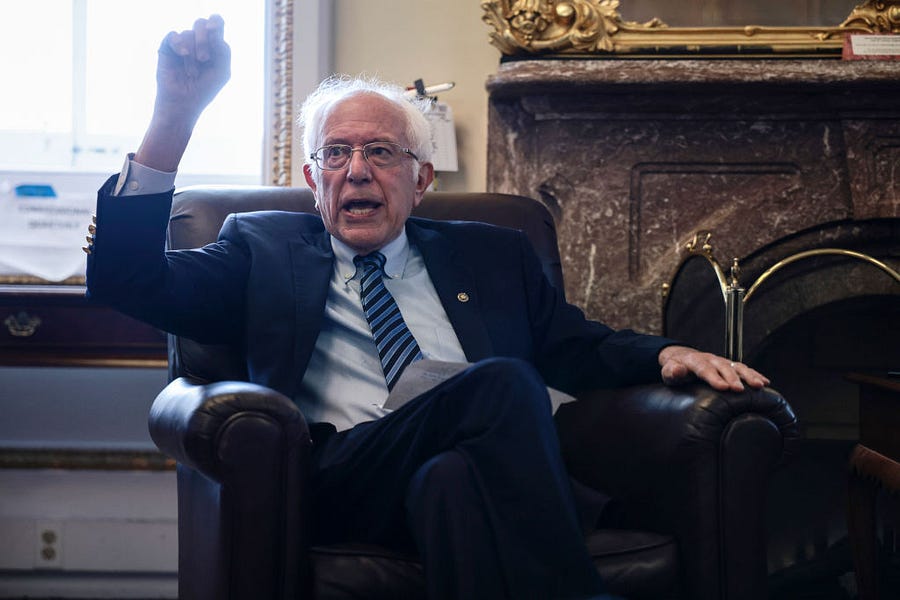Here is a very basic fact: People tend to like getting stuff for free. Ask most people, “Do you want a fancy new Mercedes?” and they’ll likely respond, “Yes.” But ask them to pay full price for it and demand drops dramatically.
Hold that thought.
Sen. Bernie Sanders is very upset that the Democrats’ “Build Back Better” package is stalled. “Poll after poll shows overwhelming support for the $3.5 trillion Build Back Better legislation,” Sanders said in a statement, “and the need to lower prescription drug costs, expand Medicare to cover dental, hearing and vision …” and so on.
But as National Review’s Charles Cooke wrote, Sanders’ statement refutes itself. In the next paragraph, the Vermont senator says, “polling also shows that despite President Biden having introduced this proposal five months ago, a majority of Americans have very little knowledge as to what is in this bill.” Sanders adds, “It is hard to ask people to have faith in their government when they have little understanding of what their government is trying to do.”
As Cooke rightly notes, it’s odd to simultaneously claim a bill is overwhelmingly popular and that a majority of Americans have no idea what’s in it.
But Sanders thinks that’s proof the mainstream media is failing to educate the public. Individual elements of the bill poll well, hence the claim it’s popular. “The foundations of American democracy are threatened not only by extremism, but by ignorance and lack of knowledge,” he exclaims.
I’m all for dispelling ignorance, but Sanders is perpetuating a myth that harms democracy, too—specifically, that massive social welfare spending is wildly popular with American voters.
In 2016, Vox polled Bernie Sanders’ proposals for nationalized health care and free college tuition. They didn’t poll the general public; they polled Bernie Sanders’ own supporters. Not surprisingly, respondents favored single-payer health care. But when asked if they’d be willing to personally pay more for it, support dropped. Two-thirds said the most they’d be willing to pay in additional taxes for “free” health care was $1,000 per year, about $83 per month. This number includes the 8 percent of Sanders supporters who said they wouldn’t be willing to pay anything for universal health care.
Cheap socialists aren’t the story here. Americans in general don’t want to pay much of anything—out of their own pocket—for the stuff progressives constantly say America is demanding.
A Washington Post poll in 2019 found that 68 percent of Americans supported taxing “wealthy families” to pay for fighting climate change. But when asked if they would agree to pay an extra $2 a month on their electric bills, support fell to less than 47 percent. That same year, an AP-NORC poll asked people if they’d be willing to spend $10 more a month on their energy bills to fight climate change. Some 68 percent of respondents said nope.
This is where the truly dangerous ignorance begins. For years now, voters have been told that the rich as well as greedy corporations are an untapped renewable resource that can pay for everything and anything. That’s false. You could confiscate all of the wealth of the top 1 percent and it wouldn’t come close to covering the bill for, say, the Green New Deal or Medicare for All. Rep. Alexandria Ocasio-Cortez may turn heads by scrawling “tax the rich” on her ball gowns, but the truth is we already do—at a remarkably progressive rate.
There’s no room here to explain why I think Biden’s promise that his $3.5 trillion package won’t be “free” for everyone making less than $400,000 per year. So, let’s just pretend it’s true. In the market, popularity is determined by what people are willing to pay for with their own money. However, in progressive politics—and in much of the mainstream media—popularity is determined by what people are willing to have other people pay for. Defining public support this way is misleading.
But even if the rich could pay for it all, democracy isn’t enriched when voters think one very small class of people is greedily standing in the way of economic salvation.
When populist politicians promise it would be easy to deliver that salvation but then fail to do it, voters feel betrayed and the politicians shift blame to sinister and corrupt forces (the “one percent,” special interests, evil corporations) or allegedly outdated obstacles to progress like the filibuster or even the Constitution itself.
That sense of betrayal doesn’t foster healthy politics. It leads to “extreme” demagogues promising to deliver what they claim the corrupt establishment could not.







Please note that we at The Dispatch hold ourselves, our work, and our commenters to a higher standard than other places on the internet. We welcome comments that foster genuine debate or discussion—including comments critical of us or our work—but responses that include ad hominem attacks on fellow Dispatch members or are intended to stoke fear and anger may be moderated.
With your membership, you only have the ability to comment on The Morning Dispatch articles. Consider upgrading to join the conversation everywhere.